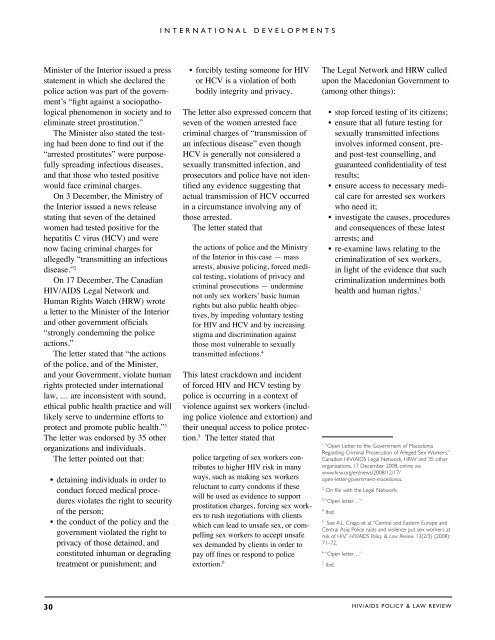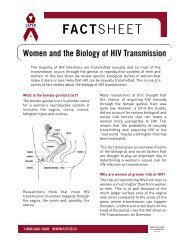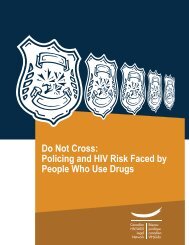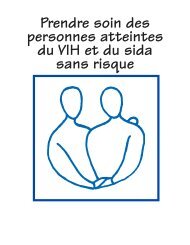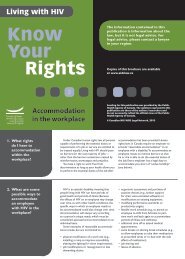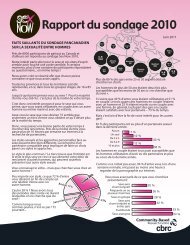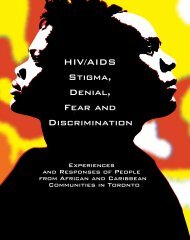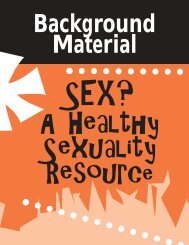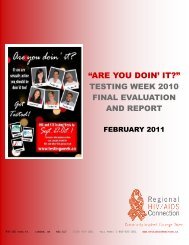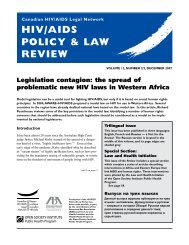HIV/AIDS Policy & Law Review, Volume 14, Number 1 ... - CATIE
HIV/AIDS Policy & Law Review, Volume 14, Number 1 ... - CATIE
HIV/AIDS Policy & Law Review, Volume 14, Number 1 ... - CATIE
You also want an ePaper? Increase the reach of your titles
YUMPU automatically turns print PDFs into web optimized ePapers that Google loves.
INTERNATIONAL DEVELOPMENTS<br />
Minister of the Interior issued a press<br />
statement in which she declared the<br />
police action was part of the government’s<br />
“fight against a sociopathological<br />
phenomenon in society and to<br />
eliminate street prostitution.”<br />
The Minister also stated the testing<br />
had been done to find out if the<br />
“arrested prostitutes” were purposefully<br />
spreading infectious diseases,<br />
and that those who tested positive<br />
would face criminal charges.<br />
On 3 December, the Ministry of<br />
the Interior issued a news release<br />
stating that seven of the detained<br />
women had tested positive for the<br />
hepatitis C virus (HCV) and were<br />
now facing criminal charges for<br />
allegedly “transmitting an infectious<br />
disease.” 2<br />
On 17 December, The Canadian<br />
<strong>HIV</strong>/<strong>AIDS</strong> Legal Network and<br />
Human Rights Watch (HRW) wrote<br />
a letter to the Minister of the Interior<br />
and other government officials<br />
“strongly condemning the police<br />
actions.”<br />
The letter stated that “the actions<br />
of the police, and of the Minister,<br />
and your Government, violate human<br />
rights protected under international<br />
law, … are inconsistent with sound,<br />
ethical public health practice and will<br />
likely serve to undermine efforts to<br />
protect and promote public health.” 3<br />
The letter was endorsed by 35 other<br />
organizations and individuals.<br />
The letter pointed out that:<br />
• detaining individuals in order to<br />
conduct forced medical procedures<br />
violates the right to security<br />
of the person;<br />
• the conduct of the policy and the<br />
government violated the right to<br />
privacy of those detained, and<br />
constituted inhuman or degrading<br />
treatment or punishment; and<br />
• forcibly testing someone for <strong>HIV</strong><br />
or HCV is a violation of both<br />
bodily integrity and privacy.<br />
The letter also expressed concern that<br />
seven of the women arrested face<br />
criminal charges of “transmission of<br />
an infectious disease” even though<br />
HCV is generally not considered a<br />
sexually transmitted infection, and<br />
prosecutors and police have not identified<br />
any evidence suggesting that<br />
actual transmission of HCV occurred<br />
in a circumstance involving any of<br />
those arrested.<br />
The letter stated that<br />
the actions of police and the Ministry<br />
of the Interior in this case — mass<br />
arrests, abusive policing, forced medical<br />
testing, violations of privacy and<br />
criminal prosecutions — undermine<br />
not only sex workers’ basic human<br />
rights but also public health objectives,<br />
by impeding voluntary testing<br />
for <strong>HIV</strong> and HCV and by increasing<br />
stigma and discrimination against<br />
those most vulnerable to sexually<br />
transmitted infections. 4<br />
This latest crackdown and incident<br />
of forced <strong>HIV</strong> and HCV testing by<br />
police is occurring in a context of<br />
violence against sex workers (including<br />
police violence and extortion) and<br />
their unequal access to police protection.<br />
5 The letter stated that<br />
police targeting of sex workers contributes<br />
to higher <strong>HIV</strong> risk in many<br />
ways, such as making sex workers<br />
reluctant to carry condoms if these<br />
will be used as evidence to support<br />
prostitution charges, forcing sex workers<br />
to rush negotiations with clients<br />
which can lead to unsafe sex, or compelling<br />
sex workers to accept unsafe<br />
sex demanded by clients in order to<br />
pay off fines or respond to police<br />
extortion. 6<br />
The Legal Network and HRW called<br />
upon the Macedonian Government to<br />
(among other things):<br />
• stop forced testing of its citizens;<br />
• ensure that all future testing for<br />
sexually transmitted infections<br />
involves informed consent, preand<br />
post-test counselling, and<br />
guaranteed confidentiality of test<br />
results;<br />
• ensure access to necessary medical<br />
care for arrested sex workers<br />
who need it;<br />
• investigate the causes, procedures<br />
and consequences of these latest<br />
arrests; and<br />
• re-examine laws relating to the<br />
criminalization of sex workers,<br />
in light of the evidence that such<br />
criminalization undermines both<br />
health and human rights. 7<br />
1<br />
“Open Letter to the Government of Macedonia<br />
Regarding Criminal Prosecution of Alleged Sex Workers,”<br />
Canadian <strong>HIV</strong>/<strong>AIDS</strong> Legal Network, HRW and 35 other<br />
organisations, 17 December 2008, online via<br />
www.hrw.org/en/news/2008/12/17/<br />
open-letter-government-macedonia.<br />
2<br />
On file with the Legal Network.<br />
3<br />
“Open letter…”<br />
4<br />
Ibid.<br />
5<br />
See A.L. Crago et al, “Central and Eastern Europe and<br />
Central Asia: Police raids and violence put sex workers at<br />
risk of <strong>HIV</strong>,” <strong>HIV</strong>/<strong>AIDS</strong> <strong>Policy</strong> & <strong>Law</strong> <strong>Review</strong> 13(2/3) (2008):<br />
71–72.<br />
6<br />
“Open letter…”<br />
7<br />
Ibid.<br />
30 <strong>HIV</strong>/<strong>AIDS</strong> POLICY & LAW REVIEW


